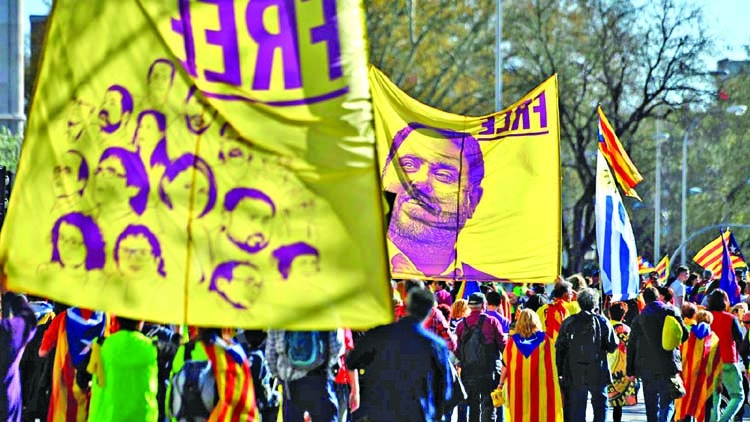Spain fights to revive international reputation

Criticism of Spain's trial of secessionist leaders has come from abroad, including from French Spain is fighting to improve its international reputation, which has taken a hit from criticism of its handling of Catalonia's independence bid and its colonial past.
Spain's reputation dropped in Germany, Italy and France after Catalonia pressed ahead with a banned independence referendum in October 2017 which was marred by a police crackdown, and then declared independence to no avail, according to research from the Elcano Royal Institute, a Madrid think-tank.Catalan separatists argue Madrid's response to the push for independence echoes the heavy-handed repression of the dictatorship of Francisco Franco, which ended with his death in 1975.
They call Catalan leaders who are in jail while on trial in Madrid over trying to break with Spain "political prisoners".Spanish Prime Minister Pedro Sanchez's government responded in October by setting up a new public diplomacy agency, Espana Global, that has led Madrid's pushback against what it frames as years of unchecked disinformation by a deft secessionist movement that has distorted the world's views of Spain.
"Spain unfortunately has not proposed an alternative narrative until now," Foreign Minister Josep Borrell said during an interview published Friday in Catalan daily El Periodico de Catalunya. "We have to dedicate much more energy, time and resources to the defence of Spain as a country that is on a par with any Western democracy."Global Spain has an annual budget of one million euros ($1.1 million) and headed by Irene Lozano, a journalist, essayist and former lawmaker who is close to Sanchez.
Its goal is to "defend Spain's democratic reputation", Lozano, who helped Sanchez write a recent book called "Resistance Manual" about his rollercoaster political career, told AFP in an interview.Recently, Lozano has also had to deal with criticism of Spain's conquest of Latin America after Mexican President Andres Manuel Lopez Obrador in March demanded Madrid apologise for the abuses inflicted on the indigenous peoples of Mexico.
This came after Los Angeles city hall in November took down a statue of the 15th-century explorer Christopher Columbus, who a local official accused of representing "a very violent past".For Madrid, these criticisms are a modern day manifestation of the "black legend" of Spain's past, that accuses Spaniards of cruelty and intolerance and which the country's rivals, notably the British empire, started promoting in the 16th century.
Lozano replies to the criticisms of Spain by recalling that the country's 1812 constitution was one of the most liberal of its time and women there won the right to vote in 1933, 12 years before neighbouring France."If one looks at indices put out by independent international organisations, Spain is among the world's most advanced democracies," said Lozano, who has a philosophy degree from London's Birkbeck College.
The 2018 Democracy Index put out by the Economist ranks Spain among the world's 20 "full democracies", ahead of the United States, France and Italy. These reports are gathered together on a website called ThisIsTheRealSpain (www.thisistherealspain.com), run by Global Spain.
As part of this defence of Spain's reputation, one person has been assigned at each Spanish embassy or consulate - around 200 people - to monitor the country's image abroad, said Lozano, who is tipped to be Spain's next foreign minister if Borrell wins a seat in the European parliament elections on Sunday.
Still, there are signs the Catalan separatists' criticism continues to sway public opinion abroad.In March, 41 French senators from across the political spectrum signed a communique denouncing what they described as the "repression" of Catalan politicians "who have been imprisoned or forced into exile because of their opinions". And German far-left party Die Linke earlier this year filed a parliamentary motion criticizing the trial of the Catalan leaders.
"There are countries where people think that the majority of Catalans favor independence" whereas separatist parties have never captured more than 50 percent of the vote, said Lozano, citing Belgium as an example. "There is still a lot of work left for us to do."
